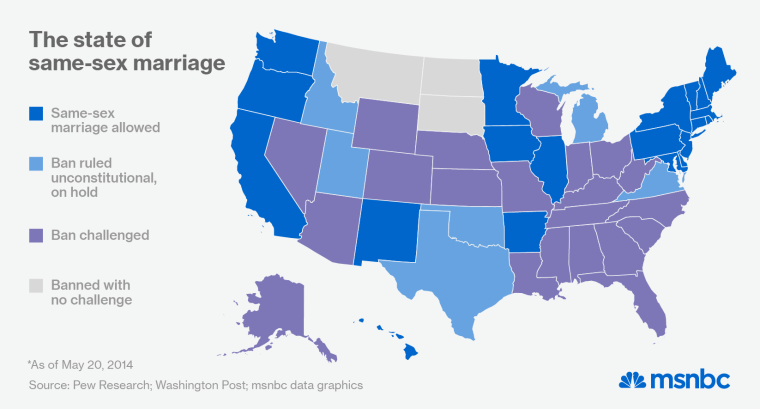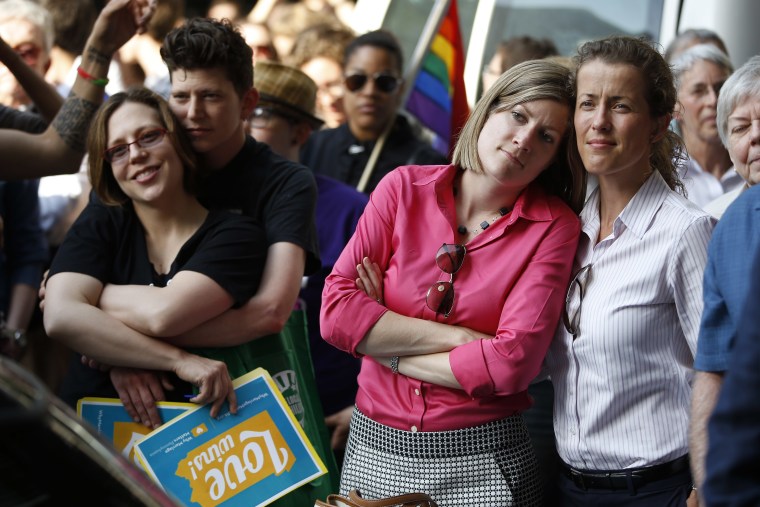Pennsylvania became the last Northeastern state to embrace same-sex nuptials on Tuesday, when a federal judge struck down an 18-year-old law defining marriage as an institution between one man and one woman.
The decision -- in the sixth largest U.S. state -- marks another milestone in the fast-moving acquisition of full civil rights for gay and lesbian Americans, just one year after the nation’s highest court brought an end to the federal Defense of Marriage Act (DOMA).
In the last 11 months, marriage equality has come to five states, bringing the total number to 18, plus the District of Columbia. Federal judges have also struck down same-sex marriage bans in Idaho, Oklahoma, Virginia, Michigan, Texas, and Utah, though their decisions are on hold for the appeals process.
Just three states -- North Dakota, South Dakota, and Montana -- currently have no marriage equality lawsuits pending in either state or federal court. Civil rights groups, however, say it won’t be long before there isn’t a ban left untouched by a legal battle.
In the aftermath of last year’s Supreme Court decision, which left the authority to determine marriage laws with the states, some gay rights advocates feared that the high court’s action could galvanize the opposition and slow efforts for national acceptance. In fact, the opposite has happened, with marriage bans collapsing like dominoes across the nation -- from the Deep South, to the Midwest, and stretching across the coasts -- thanks in large part to the Supreme Court’s legal reasoning.
Since June, no ban on same-sex nuptials has survived in state or federal court.
On Tuesday, U.S. District Judge John E. Jones III ruled that the Keystone State’s ban violated the Equal Protection Clause of the Fourteenth Amendment. Jones was appointed to the bench by former President George W. Bush and endorsed by Rick Santorum, the former Pennsylvania Senator who sought the Republican presidential nomination in 2012. Santorum is a devout Catholic and staunch conservative opposed to same-sex marriage.
Jones’ decision comes one day after a federal judge in Oregon reached the exact same conclusion, striking down that state’s ban on same-sex nuptials. Gay couples scored another victory this week in Utah where a federal judge ordered state officials to recognize more than 1,000 same-sex marriages performed during a brief window after that ban was struck down and before a stay was implemented pending appeal.
Judge Jones did not issue a stay of his ruling, meaning gay couples can begin marrying immediately. However, Republican Gov. Tom Corbett's administration is likely to appeal with the Third Circuit Court.
“The issue we resolve today is a divisive one,” wrote Jones in his opinion. “Some of our citizens are made deeply uncomfortable by the notion of same-sex marriage. However, that same-sex marriage causes discomfort in some does not make its prohibition constitutional.”
The Pennsylvania case, one of a handful of marriage equality suits under consideration in the state, was the first federal lawsuit filed since the Supreme Court dismantled DOMA last year and cleared the way for federal agencies to begin recognizing same-sex nuptials. Days after it was introduced, Democratic Attorney General Kathleen Kane said it was her “ethical obligation” as a lawyer to withdraw, given her "fundamental disagreement” with the state’s ban. Six other attorneys general have likewise refused to defend their state marriage laws.
"This is an historic day," said Kane in a statement Tuesday, following the ruling. "More importantly, today brings justice to Pennsylvanians who have suffered from unequal protection under the law because of their sexual orientation. When state-sponsored inequality exists, citizens are deprived of the full protections that the Constitution guarantees. Our commonwealth progressed today and so have the hopes and dreams of many who suffer from inequality. Today, in Pennsylvania, the Constitution prevailed."
Pennsylvania enacted its ban in 1996, the same year that the federal DOMA became law. According to a February Quinnipiac University poll, 57% of voters surveyed said they approved of same-sex marriage, while 37% said they were opposed.
Following Jones' decision, gay and lesbian couples dashed to county clerks to pick up their marriage licenses before the governor could decide his next move. If Corbett asks for an emergency stay, it could halt further same-sex weddings from taking place. County offices in Philadelphia stayed open late, the Associated Press reports, while officials in Pittsburgh were accepting requests for marriage licenses online.
Philadelphia Mayor Michael Nutter hailed Tuesday's ruling in a statement, and said he couldn't wait to perform weddings for same-sex couples.
"After nearly two decades of discrimination under Pennsylvania's DOMA, same-sex individuals, couples and families will finally be treated equally," said Nutter. "I have said many times that I am looking forward to the day when I can legally marry same-sex couples. I have a number of friends who have been waiting for me to legally perform their marriage ceremony. With Judge Jones' decision, I will finally be able to do so. But, the fight for civil rights and human rights continues in Philadelphia and all across the United States."

